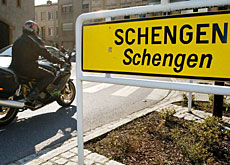Swiss see little to fear from Schengen

Swiss voters are in favour of signing up to the European Union’s Schengen and Dublin accords on cross-border crime and asylum, according to a poll.
But the rightwing Swiss People’s Party voted overwhelmingly on Saturday to fight plans to join both treaties.
The GfS Bern polling and research institute, which was commissioned by the Swiss Broadcasting Corporation, found that if a vote were held now, two-thirds of voters would support Switzerland’s move to join Schengen and Dublin.
A treaty to that effect was agreed between Switzerland and the EU last June, as part of a package of nine bilateral accords.
“Sixty-four per cent of potential voters would support the Schengen and Dublin accords if they came to a nationwide vote now,” said the institute. “Twelve per cent would be opposed and 24 per cent were undecided.”
The findings are in line with another survey, published in June, on the set of nine treaties with Brussels.
They include controversial security cooperation as well as the taxation of EU residents’ savings income in Swiss banks.
The poll was released as the People’s Party on Saturday voted against both Schengen and Dublin. Delegates meeting in Basel argued that the accords represented a threat to Switzerland’s security and sovereignty, and were a first step towards EU membership.
The government expects to sign the bilateral agreements in September before submitting them to parliament in December or March next year.
In June, it decided not to put any of the nine accords with the EU to mandatory nationwide votes.
Bilaterals
The other main political parties support the treaties with Brussels. On Friday, an official assembly of Swiss expatriates also came out in favour of the Schengen and Dublin accords.
The government has launched a wide-ranging consultation process among political parties, organisations and the country’s 26 cantons ahead of the parliamentary debate.
Opponents, including the isolationist Campaign for an Independent and Neutral Switzerland (CINS) have dismissed the bilateral accords as a “back-door entrance to the EU”.
They also argue that doing away with border checks – required by Schengen – could lead to a wave of criminal foreigners entering the country.
In May 2000 Swiss voters approved a first set of bilateral treaties with the EU covering mainly labour, trade and transport issues.
The accords, which finally came into force in June 2002, had been challenged by two small rightwing parties.
The Swiss government has ruled out negotiations on full EU membership in the near future, but it pledged to review the situation before 2008.
swissinfo, Urs Geiser
An opinion poll shows 64% of potential voters approving closer security cooperation between Switzerland and EU member countries.
Delegates of the rightwing People’s Party voted overwhelmingly on Saturday to reject the Schengen and Dublin accords.
Parliament is due to debate the bilateral treaties before next March.
The Schengen/Dublin accords govern closer cooperation on security and asylum.
The agreement is one of a set of nine bilateral accords.
A first series of bilateral agreements came into force in June 2002.

In compliance with the JTI standards
More: SWI swissinfo.ch certified by the Journalism Trust Initiative












You can find an overview of ongoing debates with our journalists here . Please join us!
If you want to start a conversation about a topic raised in this article or want to report factual errors, email us at english@swissinfo.ch.